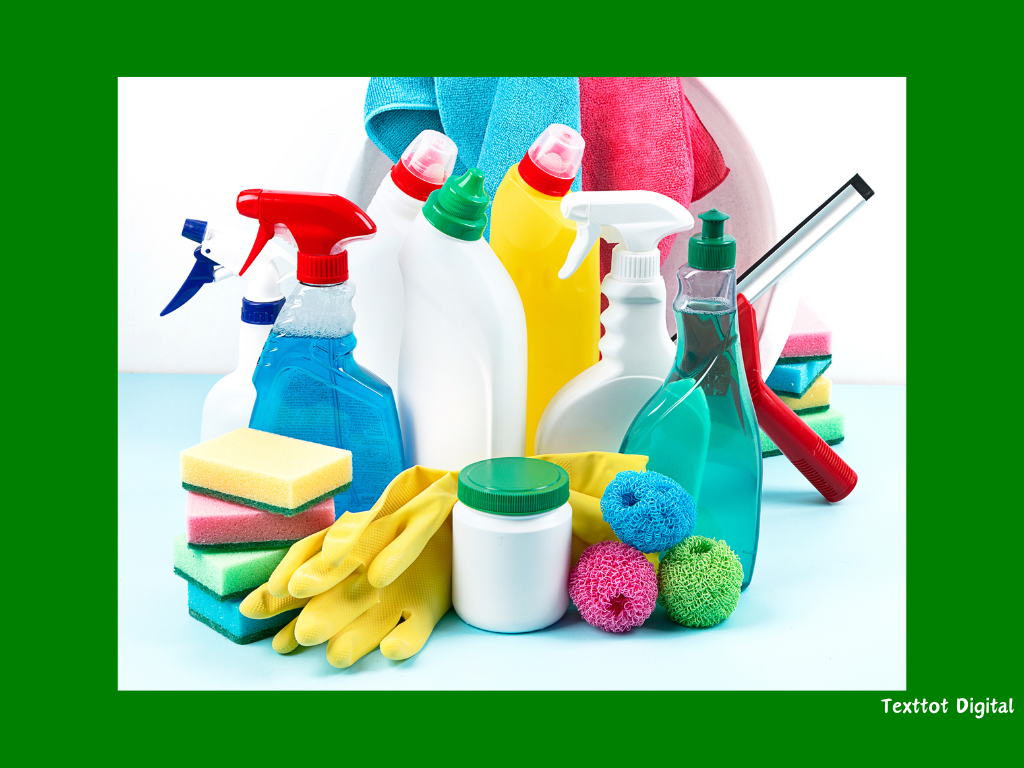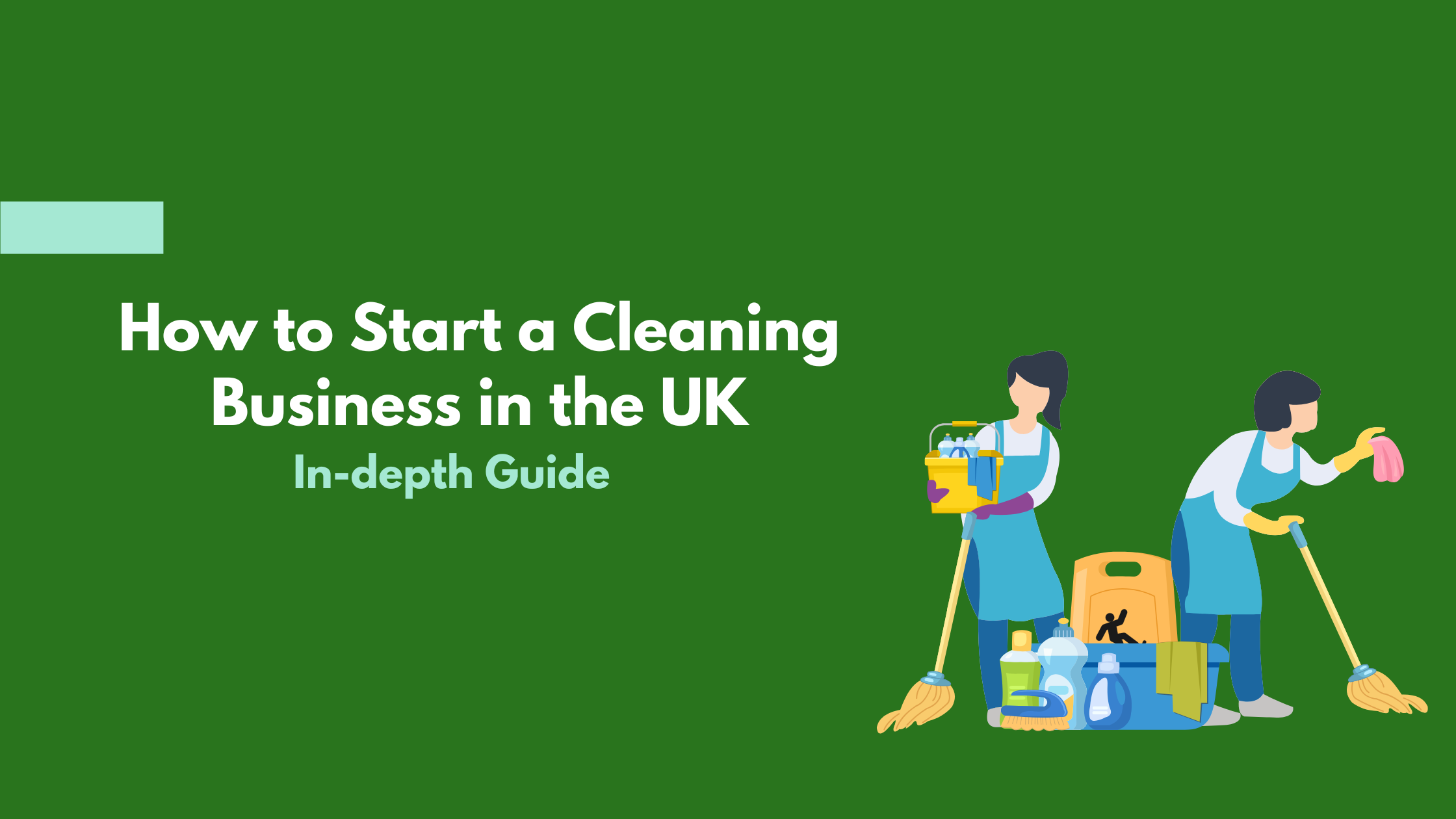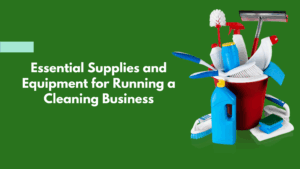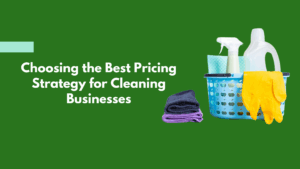If you’re thinking about starting a cleaning business in the UK, you’re making a smart choice. The cleaning industry is booming, with growing demand for domestic, commercial, and specialist cleaning services. In fact, the UK cleaning market is worth over £55 billion, and with more homes and businesses outsourcing their cleaning needs, there’s plenty of opportunity for new businesses to thrive.
But here’s the thing, starting a successful cleaning business isn’t just about buying supplies and offering your services. You need to set up your business the right way, follow legal requirements, price your services correctly, and market yourself effectively. That’s exactly what we’re going to walk you through in this guide.
We’ll cover everything about how to start a cleaning business, from choosing the best business structure and handling legal paperwork to finding the right equipment, setting your prices, and attracting clients fast. By the end of this guide, you’ll have a clear roadmap to launch and grow a profitable cleaning business in the UK. Let’s get started.
Table of Contents
Understanding the UK Cleaning Industry
The cleaning industry in the UK is one of the fastest-growing service sectors, worth over £55 billion and employing more than 1.6 million people. Businesses and homeowners are outsourcing cleaning more than ever, creating steady demand for professional services.
Whether it’s domestic cleaning, office cleaning, or specialist services like end-of-tenancy or deep cleaning, there’s always a market for reliable and high-quality cleaners.
Among many, one reason for this growth is convenience. Busy professionals, landlords, and businesses prefer to pay for cleaning rather than spend time doing it themselves.
Another factor is hygiene awareness, which has increased significantly in the last few years, especially after the COVID-19 pandemic. This means that if you set up your business correctly and offer a great service, you’ll always have potential clients.

Choosing Your Niche: Domestic, Commercial, or Specialist Cleaning
Before you start your business, you need to decide what type of cleaning services you’ll offer. The three main categories are domestic cleaning, commercial cleaning, and specialist cleaning.
Domestic cleaning focuses on households and includes services like regular house cleaning, deep cleaning, and one-off jobs such as after-party or end-of-tenancy cleaning. This is a good option if you want to start small with minimal equipment and a lower budget.
Commercial cleaning, on the other hand, involves working with businesses, offices, and industrial spaces. This requires more staff, specialized equipment, and often happens outside regular working hours. However, commercial contracts can be lucrative and provide consistent income.
Specialist cleaning covers niche services like carpet cleaning, window cleaning, post-construction cleaning, or biohazard cleaning. These services require specific training and equipment but can command higher prices.
Choosing a niche doesn’t mean you can’t expand later, but starting with a clear focus will help you stand out in a competitive market.
What Is the Right Business Structure for Your Cleaning Business?
One of the first decisions you need to make when starting your cleaning business in the UK is choosing a legal structure. This will affect your taxes, liability, and how you run your business. Most small cleaning businesses start as either sole traders or limited companies.
If you register as a sole trader, you’ll have complete control over your business and an easier setup process. You simply need to register with HMRC for self-assessment and report your earnings each year.
However, the main downside is that you’ll be personally responsible for any business debts. If something goes wrong, your personal assets, like your home or savings, could be at risk.
A limited company, on the other hand, offers more legal protection. The business is considered a separate entity, meaning your personal assets are protected if the company runs into financial trouble.
While this structure comes with more paperwork, tax benefits, and a more professional image, it’s often the better choice if you plan to scale your business.
Clients, especially commercial ones, are more likely to trust and work with a registered company than an individual sole trader.
Registering Your Cleaning Business in the UK
Once you’ve chosen your business structure, the next step is registering your business. If you’re operating as a sole trader, you need to register with HMRC for self-assessment. This is a straightforward process, and you can do it online.
For a limited company, you must register with Companies House and provide details like your business name, address, and director information. You’ll also need to register for Corporation Tax with HMRC.
If you expect to earn over £85,000 per year, you must also register for VAT. Even if you don’t hit that threshold immediately, voluntarily registering for VAT can make your business look more professional and allow you to reclaim VAT on business expenses.
Setting Up a Business Bank Account for Your Cleaning Business
No matter which structure you choose, it’s essential to separate your personal and business finances.
This is because opening a business bank account will make it easier to manage income, track expenses, and handle taxes.
Many banks offer free business accounts for startups, so shop around for the best deals.
You should also keep clear financial records from day one. Using accounting software like QuickBooks, Xero, or FreeAgent will help you track earnings, expenses, and tax obligations.
If you’re not confident with bookkeeping, consider hiring an accountant or using HMRC’s Making Tax Digital (MTD) tools to stay compliant.
Legal and Licensing Requirements for Cleaning Businesses in the UK
Starting a cleaning business in the UK doesn’t usually require a specific license, but legal compliance is crucial. Specialist services like biohazard or industrial cleaning may need permits, and all businesses must follow Health and Safety Executive (HSE) regulations.
The Health and Safety at Work Act 1974 also requires risk assessments, employee training, and proper handling of chemicals. Insurance is essential, with public liability and employers’ liability being key requirements.
In addition, contracts protect your business by setting clear service terms, while GDPR compliance ensures secure handling of customer data.
As your business grows, staying legally compliant helps secure high-profile clients and avoid legal issues.
Startup Costs and Essential Equipment

Starting a cleaning business in the UK is one of the most affordable ways to become your own boss.
Unlike other businesses that require expensive premises or stock, a cleaning business has relatively low startup costs. However, the amount you need will depend on the type of cleaning service you offer.
If you’re starting as a solo domestic cleaner, you can get started with as little as £500 to £1,000 for essential supplies, insurance, and marketing.
But if you’re setting up a professional cleaning company with commercial clients and employees, your startup costs can range from £3,000 to £10,000, depending on equipment, insurance, and business setup fees.
One of the biggest expenses will be insurance, which can range from £100 to £500 per year, depending on coverage. If you plan to register as a limited company, there’s a £12 Companies House registration fee.
You’ll also need to consider costs for branding, marketing, and possibly a website, which can cost between £200 and £1,500, depending on how professional you want it to look.
Essential Equipment and Supplies
Having the right equipment is key to delivering high-quality cleaning services efficiently. At the basic level, you’ll need cleaning chemicals, microfiber cloths, sponges, a mop and bucket, and a vacuum cleaner.
If you’re doing commercial or industrial cleaning, you may need heavy-duty floor scrubbers, carpet cleaners, pressure washers, or steam cleaners.
A professional-grade vacuum cleaner can cost between £100 and £500, while an industrial carpet cleaner can cost anywhere from £300 to £1,500.
If you want to be taken seriously and land higher-paying clients, you need to invest in quality cleaning products. Many clients prefer eco-friendly cleaning, so using non-toxic and biodegradable products can give you an edge over competitors.
You’ll also need PPE (Personal Protective Equipment) like gloves, masks, and aprons to ensure safety while working with chemicals.
Should You Buy or Lease Equipment?
For bigger jobs, you might be wondering whether to buy or lease equipment. Buying is a long-term investment, but leasing allows you to access high-end machines without the upfront cost.
Leasing a professional carpet cleaner, for example, can cost around £50 to £100 per month, whereas buying one outright can be upwards of £1,500.
If you’re just starting and want to keep costs low, leasing might be the better option. However, if you plan to stay in the business long-term, investing in your own equipment will save you money over time.
Transportation: Do You Need a Vehicle?
If you’re offering domestic cleaning services, you can often get by using public transport or working within a small radius. However, if you’re planning to scale your business or target commercial clients, having a reliable vehicle is essential.
A small van or estate car is ideal for carrying cleaning supplies and equipment. If you already own a vehicle, you’ll need business vehicle insurance, which typically costs between £300 and £800 per year, depending on coverage.
If you don’t have a vehicle and need one for your business, consider buying a second-hand van to keep costs low. Leasing is another option, with costs ranging from £150 to £300 per month, depending on the model.
How to Keep Costs Low When Starting Out
To keep your startup costs manageable, start with the essentials and upgrade as your business grows. Instead of renting office space, work from home in the beginning.
Buy cleaning supplies in bulk to save money and look for second-hand or refurbished equipment.
Many new business owners make the mistake of not spending on branding and proper cleaning services website design. While your top priority should be delivering excellent service and building a strong reputation, these are very important.
Once your cleaning business starts bringing in consistent income, reinvest your profits into better equipment and scaling your operations.
What Is the Best Pricing Model for Your Cleaning Services? How Much Should You Charge?

Choosing the best pricing model for your cleaning services depends on factors like service type, location, competition, and business goals.
Common models include hourly rates, flat fees, per-room pricing, or square footage-based pricing. Hourly rates work well for unpredictable jobs, while flat fees provide customers with cost certainty. Per-room or square footage pricing is ideal for larger spaces and commercial contracts.
When setting prices, consider labor, supplies, overhead, and profit margin. Research competitors to stay competitive without undervaluing your services. Offering package deals or recurring service discounts can attract long-term clients.
It’s also crucial to adjust pricing as costs change to maintain profitability. Want a more in-depth guide? Check out our full article on the best strategy for pricing your cleaning service!
Marketing Your Cleaning Business: How to Get Clients Fast in the UK
Getting clients fast for your cleaning business in the UK requires a solid online presence, starting with a well-designed website.
A professional website for cleaning business builds credibility, attracts potential customers, and showcases your services effectively. Investing in cleaning services website design also ensures that visitors can easily find information, book services, and contact you.
If you’re wondering how to make a website for cleaning services, using the best website builder for cleaning business can simplify the process, allowing you to create a sleek, user-friendly site that converts visitors into paying clients.
However, not all website builders offer the customization and marketing features needed to drive sales. That’s why we provide sales-driven website design tailored to cleaning businesses, ensuring your site ranks well on search engines, looks professional, and encourages bookings.
Beyond your website, leverage social media marketing, local SEO, and customer reviews to attract clients quickly.
Furthermore, engaging content, special promotions, and partnerships with property managers or real estate agents can boost visibility big time.
As a matter of fact, here’s an in depth guide detailing 22 ways that you can get clients fast for your cleaning business in the UK.
Maintaining a Competitive Edge in the Cleaning Industry

The cleaning industry is highly competitive, with new businesses launching all the time. If you want long-term success, you can’t afford to blend in, you need to stand out.
One of the best ways to stand out is by offering something your competitors don’t.
That could be exceptional customer service, eco-friendly cleaning options, or a satisfaction guarantee that builds trust. Understanding what sets you apart and making it a core part of your brand will help you stay ahead.
Market research is also crucial. Competitors change their strategies, prices, and services over time, and you need to keep up. Checking reviews of similar businesses can give you insight into what customers love and what frustrates them.
If people are complaining about unreliable cleaners or poor communication, that’s your chance to position yourself as the business that does things differently.
Consequently, keeping an eye on trends, from new cleaning technologies to customer expectations, ensures you’re always one step ahead.
Investing in Training and Innovation
A skilled and professional cleaning team is one of the biggest assets you can have.
Customers notice the difference between an average cleaner and someone who takes pride in their work. Ongoing training helps your staff improve their techniques, work more efficiently, and provide a consistently high level of service.
Whether it’s teaching them how to handle delicate surfaces, use new equipment, or interact with clients professionally, investing in training pays off in customer satisfaction and retention.
Innovation also plays a key role in staying competitive. Technology is changing the cleaning industry, with new tools and products that make cleaning faster, more effective, and more environmentally friendly.
Robotic vacuums, electrostatic sprayers, and chemical-free steam cleaning are just a few examples of how the industry is evolving.
Staying updated on the latest innovations and incorporating them into your services can give you an edge over businesses that are stuck in their old ways.
Building a Strong Brand and Reputation
Your brand is more than just a logo or a name, it’s the perception people have of your business.
A strong brand makes your business more memorable and builds trust with potential customers. That’s why it’s important to maintain a consistent image across all your marketing channels, from your website and social media to your uniforms and vehicles.
Online reviews are one of the most powerful tools for reputation building. Studies show that 93% of consumers read online reviews before making a purchase decision, and cleaning services are no exception.
Encouraging happy clients to leave positive reviews on Google and other platforms can make a huge difference in attracting new customers.
Responding professionally to negative reviews also shows that you take feedback seriously and are committed to customer satisfaction.
Adapting to Market Changes
No industry stays the same forever, and cleaning is no different. Whether it’s new regulations, economic shifts, or changing customer expectations, the businesses that survive are the ones that adapt.
The COVID-19 pandemic, for example, drastically changed the demand for deep cleaning and disinfection services. Businesses that quickly adjusted to offer specialized sanitation services saw massive growth, while those that didn’t struggled.
Keeping a close eye on industry trends helps you pivot when needed. If more customers start requesting green cleaning solutions, for instance, investing in eco-friendly products and marketing them as part of your brand can help you capture that demand.
Flexibility and a willingness to evolve are key to staying relevant.
Leveraging Customer Loyalty and Referrals
A business that relies only on new customers will always struggle. The most successful cleaning companies build a base of loyal, repeat clients. One way to do this is by offering incentives like discounts for regular bookings or referral programs that reward customers for bringing in new business.
People trust recommendations from friends and family more than any advertisement. If your current customers love your service, they’re likely to tell others, especially if you give them a reason to.
A well-structured referral program can turn satisfied clients into brand ambassadors, helping you grow without spending a fortune on marketing.
Sustaining Long-Term Growth
Maintaining a competitive edge isn’t just about short-term wins, it’s about sustaining growth over the long haul. This means balancing customer acquisition with retention, investing in your team, and staying adaptable.
The cleaning industry will continue to evolve, but businesses that focus on quality, innovation, and customer relationships will always have an advantage.
By continuously improving your services, staying informed about industry trends, and building a strong reputation, you can ensure that your cleaning business remains a leader in the market.
Conclusion
Starting a successful cleaning business in the UK requires careful planning, dedication, and the right strategies.
From choosing your niche and registering your business to marketing your services and delivering exceptional results, each step plays a vital role in your success.
Consistency, professionalism, and excellent customer service will help you build a strong reputation and grow your client base.
As you scale, also consider investing in staff, technology, and branding to stand out in the competitive market.
With persistence and smart decision-making, your cleaning business can thrive, providing steady income and long-term success.



